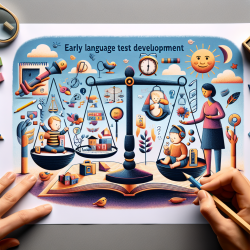The early years of a child's life are a critical period for language development. Recognizing and addressing language delays as early as possible can significantly impact a child's communication skills, social interactions, and academic success. Recent research, including a study by Tibie Rome-Flanders, PhD, provides valuable insights into the stability and usefulness of language test results in infants under two years of age. This research offers practitioners and parents alike a roadmap for early identification and intervention for language delays.
One of the study's key findings is the demonstrated stability of parent-report instruments, such as the Receptive Expressive Emergent Language Scales (REEL), from nine months onwards. These instruments correlate with direct language testing results at 24 months, such as those obtained from the Reynell Developmental Language Scales. This correlation underscores the importance of early, parent-reported screenings in identifying potential language development issues.
For practitioners, incorporating parent-report screenings into routine evaluations can enhance early detection efforts. These tools are not only reliable but also accessible and cost-effective, making them an excellent first step in a multi-tiered approach to language assessment.
Moreover, the research highlights the significance of early intervention. With early detection, practitioners can implement targeted interventions to support language development, potentially mitigating or even preventing long-term language difficulties. This proactive approach aligns with the broader trend in speech-language pathology towards remediation of less than optimal language development at the earliest possible age.
However, the study also cautions practitioners about the variability in individual development rates and the potential for over- or under-identification of language delays. Thus, while parent-report instruments are valuable, they should be part of a comprehensive assessment strategy that may include direct testing and observation over time.
In light of this research, practitioners are encouraged to:
- Integrate parent-report language screenings into early assessment protocols.
- Advocate for and participate in early intervention programs that support language development from infancy.
- Continue education on the development and refinement of early language assessment tools.
- Engage in further research to expand the evidence base on early language development and assessment.
This study not only reinforces the importance of early detection and intervention but also opens the door for future research to refine our understanding and methodologies. By leveraging these insights, practitioners can significantly impact the lives of children with language delays, setting them on a path to successful communication and learning.
To further explore the findings and implications of this research, practitioners are encouraged to read the original study. For more information, please follow this link: Stability and Usefulness of Language Test Results Under Two Years of Age.










